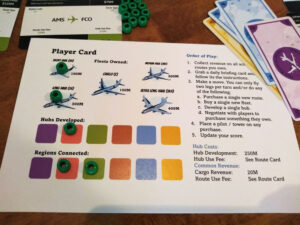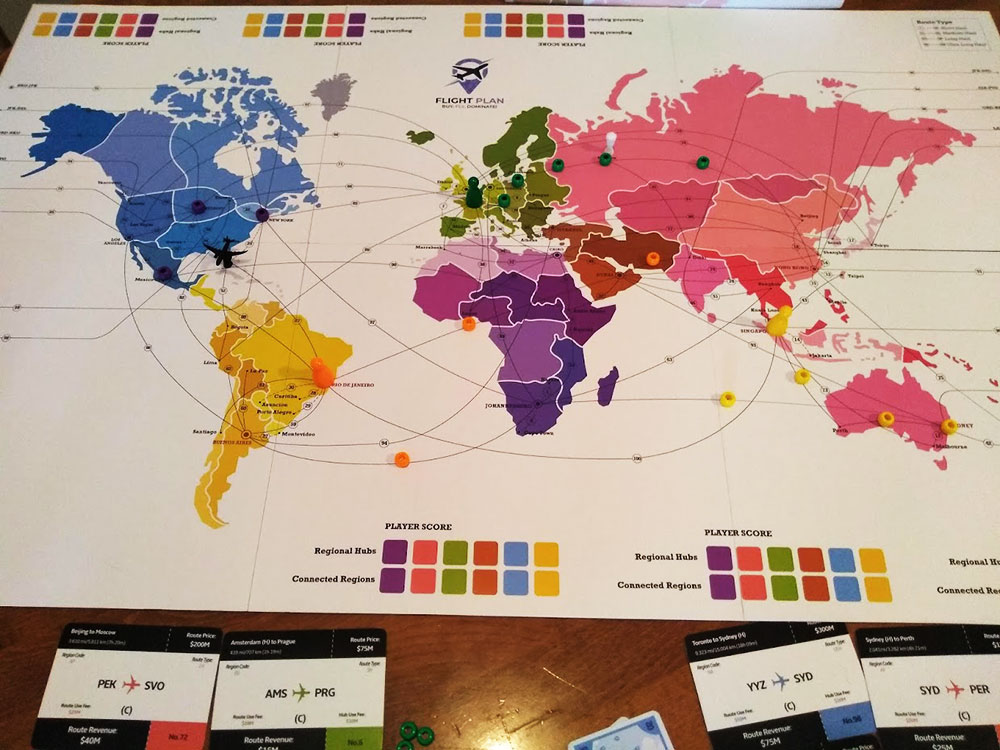Note: This preview uses pre-release components and rules. What you see here may be different from the final, published game. This post was a paid preview, you can find out more information here.
 As our recent Quest list showed, when it comes to route-building games, train-themed entries are well-represented. But airplane enthusiasts don’t see a lot of games that scratch their itch to jet off to exotic locales or build a globe-spanning empire of airlines. Is this the game to fill that gap?
As our recent Quest list showed, when it comes to route-building games, train-themed entries are well-represented. But airplane enthusiasts don’t see a lot of games that scratch their itch to jet off to exotic locales or build a globe-spanning empire of airlines. Is this the game to fill that gap?
Flight Plan, launching on July 25th on Kickstarter, is designed by David Kuhn. The game supports 2-6 players and should take about 1 hour to play.
Gameplay Overview:
In Flight Plan, players will be building their own airline empire, consisting of routes, fleets of airplanes, and regional hubs. There are no victory points in the game, and while money is used, you’re not necessarily aiming to be the wealthiest air baron at the table. To win, you’ll need to dominate the global market, which means being the first to achieve one of the three-win conditions. One way to obtain victory is to link all six regions with a network of connecting routes. Another path to success is to establish a hub in three of the six regions. Finally, you can win the game by owning all short-haul routes in two adjacent regions, providing that one is in the North and the other in the South (such as Asia and the Middle East).
During setup, players will be given three route cards and $750 million (don’t get excited, it goes quickly). From this, they’ll decide which routes to purchase, buy fleets, and build a hub in their departure city, if they wish. Then players will go around the table taking turns until someone wins.

Players begin their turn by collecting revenue on their active routes, which is the primary source of income throughout the game. Each route card provides revenue, which can be increased by $20 million if it is a cargo route and the player has invested in a cargo fleet. Revenue can only be collected from routes for which the player has purchased the matching fleet type.
Fleets have a few uses in Flight Plan. First of all, if you want to fly along a particular route, you must have purchased the corresponding fleet, such as Long Haul, Short Haul, or Ultra Long Haul. Also, without the relevant fleet, you can’t collect revenue from a route card. Cargo fleets are a special type of fleet that isn’t a prerequisite for the above, but owning a cargo fleet can give you a revenue bump on cargo routes.
After gaining revenue, the player will draw a Daily Briefing card, which is a mechanism for introducing a chance that could force you to rethink your plan for the round. Daily Briefings apply only to the player who draws them and can be either a benefit or a penalty, which must be paid immediately. Possible outcomes include having to pay cash to other players, gaining/losing money from/to the bank, or losing a turn.

Once the Daily Briefing is resolved, the player can then carry out their turn by continuing to do any number of the available actions. Options include purchasing routes, flying active routes, buying fleets, building hubs, or even negotiating trades with other players. You are only allowed to buy a route if it starts or ends in your current location, so players will have to move about the map to access those desirable routes. When choosing to fly a route owned by an opponent, players must pay the route use fee to that player.
When money is tight, players can sell routes, fleets, and hubs to other players, or they can deactivate routes and fleets to gain cash equal to half the value. But if you run out of money and don’t have any more active assets to squeeze cash from, you’ll go bankrupt and the bank will auction off your assets to the remaining players.
The game ends when a player has achieved one of the three victory conditions, but only if all their assets are active.

Gameplay Impressions:
The airline theme in Flight Plan is a refreshing detour from the many land-based route-building games out there. But, thankfully, the waiting at airports and standing in line at security checkpoints have been excised from the flying experience in favor of a more high-level, jet-setting backdrop. You’ll be handling millions each turn as you journey across the map, buying up lucrative routes and expanding your fleets.
The gameplay in Flight Plan is straightforward and moves along smoothly once players are familiar with the flow of the game, which should only take a turn or so. It’s fairly simple to begin play with a solid game plan by targeting one of the three-win conditions and then pushing all your resources and efforts in that direction. There’s not really much reason to spread yourself thinly by attempting to hedge your bets and line up multiple paths to victory. In fact, that could be your downfall.

If you’ve chosen to build a network that connects all six regions (North America, South America, Europe, Asia-Pacific, Middle East, and Africa), then it’s best to map a path that takes you to each and get busy flying. Perhaps the riskiest victory condition to commit to is owning all short-haul routes in two adjacent regions. An opposing player could easily see what you’re up to and buy just one of those routes to thwart you. Negotiation is allowed, so you could attempt to purchase the needed route from them, but that’s going to cost a pretty penny even if they’re willing to give it up. So, winning via a connected network or by owning three hubs are your best bets.
The greatest obstacle, however, to your quest to dominate the airline industry is the Daily Briefing cards. Each turn, you will draw a card that could help you immensely (such as providing $100M!) or that can torpedo your plans for the round (causing you to lose all revenue and skip the turn!). This element of chance seems designed to keep players on their toes and to hinder players from just implementing a long-term strategy and engaging the autopilot. It can certainly be deflating to have a big turn planned out only to have to give a chunk of your empire to another player and not be able to afford the routes you’d wanted to purchase. Conversely, it’s definitely satisfying to turn over the Briefing card and find that you’ve got an extra few million dollars to play with this round. It’s important that players go into the game understanding that the briefings give and take indiscriminately, so be prepared to accept the impact that chance can have on your gameplan.
Final Thoughts:
Flight Plan will appeal most to those with an interest in planes and the airline industry in particular. If you’ve always dreamed of being a mogul of the skies, then you might enjoy throwing around millions and buying up routes to exotic destinations. The game is not overly complex, so it can serve as an entry-level, or gateway, game for players looking to move beyond the standard old school fare like Monopoly or Risk. Just be ready to weather the storm of chance that the Daily Briefings will toss your way.
Flight Plan launches on July 25th on Kickstarter, so be sure to give it a look to learn more about the campaign and back your copy.





















